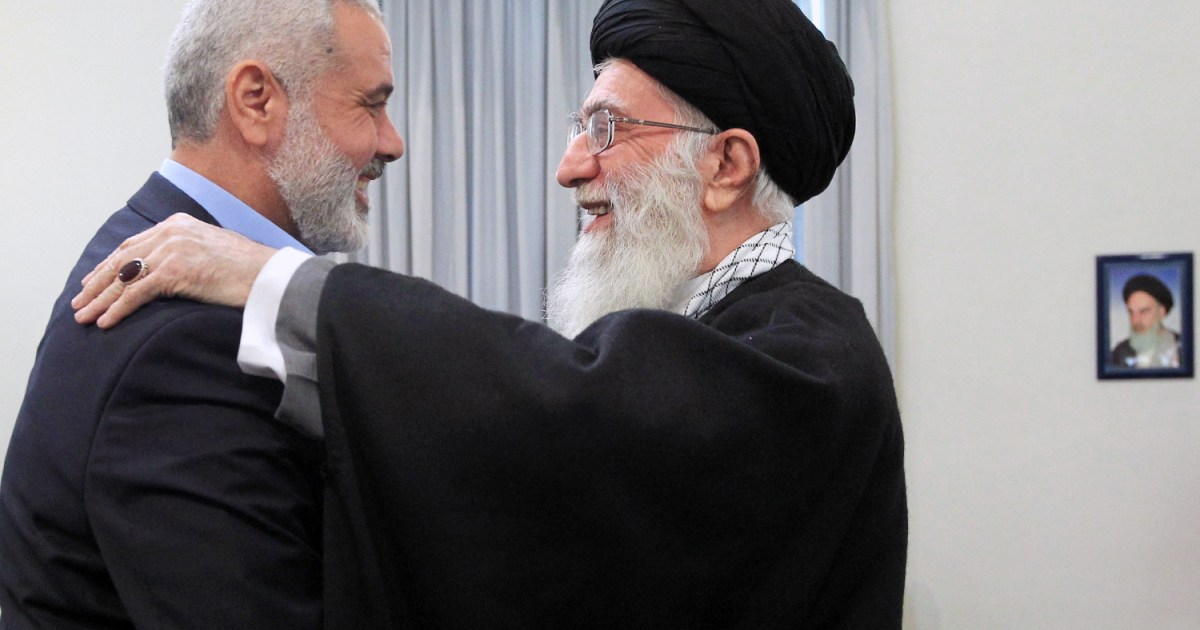Haniyeh visited Tehran twice since the Al-Aqsa Flood operation (social networking sites)
Tehran
-
Immediately after the beginning of the Iranian New Year holiday, the capital Tehran witnessed in the second half of last week successive and simultaneous visits by the head of the Political Bureau of the Islamic Resistance Movement (Hamas), Ismail Haniyeh, and the Secretary-General of the Islamic Jihad Movement, Ziad al-Nakhalah.
The visits included political and military meetings at the highest levels in Iran, where both Haniyeh and Al-Nakhalah met with Iranian Leader Ali Khamenei and President Ebrahim Raisi, in addition to other figures. This was Haniyeh's second visit and Al-Nakhal's first visit to Tehran since last October 7.
There was also a meeting between Haniyeh and Al-Nakhalah in Tehran, and the Hamas and Islamic Jihad movements announced - in a joint statement - that the success of any indirect negotiations depends on the cessation of the aggression, the occupation’s withdrawal from the Gaza Strip, the freedom of the displaced to return, and the entry of aid coinciding with an exchange of prisoners.
Ziad Al-Nakhalah, Secretary-General of the Islamic Jihad Movement, met with Khamenei, Raisi and other Iranian figures (Al-Jazeera)
Military and political support
Speaking to Al Jazeera Net, the representative of the Islamic Jihad movement in Tehran, Nasser Abu Sharif, confirmed that this battle was started by the Palestinian people for clear objective reasons, and all of them were Palestinian reasons, but there is also a duty other than the duty of the Palestinian people, which is a national, national, religious and humanitarian duty.
Abu Sharif stressed that the issue of Palestine now is not only an issue of freedom for the Palestinian people, but rather a first-class humanitarian and moral issue. Therefore, “we have dialogued and discussed with Tehran the basic issues that can support the Palestinian people on the political and military levels, as well as on the media and propaganda side.” And clarifying the Palestinian narrative, and the legal and humanitarian issues now facing the Gaza Strip.”
He added that Gaza is currently facing a humanitarian catastrophe in the true sense, and the whole world and international organizations are talking about it, and Iran is an important regional country that has its weight in the region and even at the world level. He said, "We informed the Iranian officials of all the aspects to which the Palestinian issue is exposed, especially at the military, political, and humanitarian levels." .
He pointed out that Iran will not enter the negotiations and will remain supportive of the Palestinian people in all regional and international forums, as it tries to play its role in light of this major, comprehensive aggression led by America and the West.
He said, "We are counting on the forces of our nation and Iran as a major supporter of the resistance and rights of the Palestinian people," stressing that Iran is not a party to the negotiations and the Palestinian people are the ones negotiating for themselves.
Lined messages
For his part, Professor of Political Science specializing in Palestinian affairs, Mansour Barati, believes that the visit of the leaders of the Palestinian resistance factions to Iran, despite the passage of nearly 6 months since the war on Gaza, shows, on the one hand, that the resistance factions, led by Hamas, have been under pressure in recent months in one way or another. With another in the negotiation process, but on the other hand, Iran continues its principled policy of supporting the axis of resistance as it was before.
He considered, in statements to Al Jazeera Net, that the presence of Haniyeh and Al-Nakhalah, and their official reception and meeting with the highest leaders in Iran, such as the Supreme Leader, carry a message that increasing pressure on Hamas and other resistance groups will make them closer to Tehran and compensate for their lack of support through increased Iranian support.
Prati added, “Perhaps the most important sign of Tehran’s influence during the negotiations can be read in Hamas’s insistence on the basic position of ending the war as a precondition for exchanging hostages with Palestinian prisoners,” noting that Haniyeh and Nakhalah’s visit to Tehran conveys a message to Tel Aviv and its supporters that the resistance factions are in Al-Maidan also wants to continue the war, and if Tel Aviv does not agree to Hamas’ conditions in the upcoming negotiations, these factions will take a more solid position, and the attacks of other factions from the axis of resistance against Israel may intensify.
Consultation visits
In turn, political analyst Mukhtar Haddad points out that this is Haniyeh's second official visit to Iran since the Al-Aqsa flood. Likewise, the Iranian Foreign Minister had several visits to countries in the region, during which he met Al-Nakhalah in Beirut and Haniyeh in Doha.
He said that this means that Iran is in constant contact with the leaders of the Palestinian resistance, and that there is continuous coordination and consultation with the axis of resistance, especially the Palestinian resistance, considering the level of meetings in Tehran as evidence of that.
He added in his speech to Al Jazeera Net, "There is a Security Council resolution, and pressure must be put on the entity, but things have proven that the pressure must be broader than what we are witnessing in the Security Council and the opening of fronts of resistance in Lebanon, Yemen and Iraq."
As for the professor of international relations, Mohsen Jalil Wand, he points out that the visit comes within the framework of reconsidering the estimates related to the war, adding - in his speech to Al Jazeera Net - that “the equations of war are in a changing situation, and Hamas undoubtedly expected Israel’s response, but circumstances are changing in the course of the war.” This requires reconsidering estimates and coordination.”
Source: Al Jazeera

